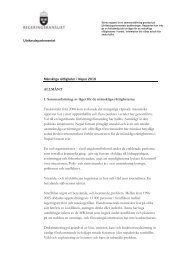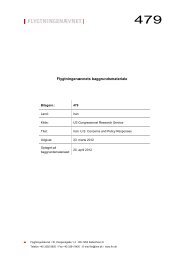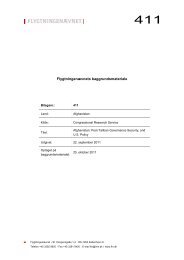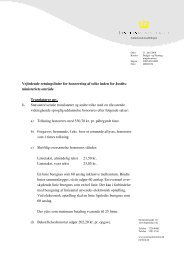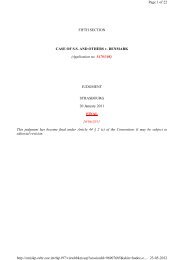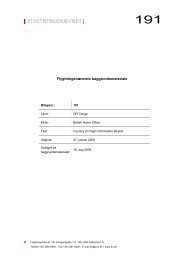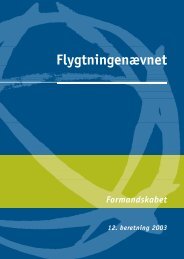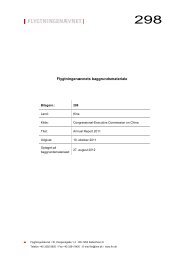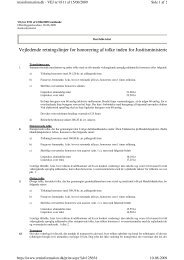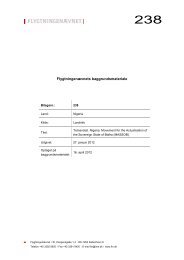Annual Report - National Human Rights Commission
Annual Report - National Human Rights Commission
Annual Report - National Human Rights Commission
You also want an ePaper? Increase the reach of your titles
YUMPU automatically turns print PDFs into web optimized ePapers that Google loves.
Annexure 16<br />
○ ○ ○ ○ ○ ○ ○ ○ ○ ○ ○ ○ ○ ○ ○ ○ ○ ○ ○ ○ ○ ○ ○ ○ ○ ○ ○ ○ ○ ○ ○ ○ ○ ○ ○ ○ ○ ○ ○ ○ ○ ○ ○ ○ ○ ○ ○ ○ ○ ○ ○ ○ ○ ○ ○ ○ ○ ○ ○ ○ ○ ○<br />
○<br />
that it travels beyond the capacity of the ordinary law enforcement agencies to tackle it under the<br />
ordinary penal law. Experience has shown us that ‘terrorism’ is generally an attempt to acquire<br />
helplessness in the minds of the people at large or any section thereof and is a totally abnormal<br />
phenomenon. What distinguishes ‘terrorism’ from other forms of violence, therefore, appears to<br />
be the deliberate and systematic use of coercive intimidation…”<br />
Different aspects of terrorism have been a concern of world community. The problem of hijacking<br />
was dealt with in the 1963 Tokyo Convention, 1970 Hague Convention and 1971 Montreal<br />
Convention. Though there have been as many as 12 conventions and a declaration dealing with<br />
the subject but it was the killing of Israeli athletes at the Munich Olympics which led to the<br />
inscribing of international terrorism on the agenda of the United Nations General Assembly in<br />
1972 at the request of the then Secretary General of United Nation and the problem of international<br />
terrorism was confronted both politically and legally and in its entirety rather than concentrating<br />
on any specific acts of terror. The menace, however, still continues and is on the rise globally.<br />
Conflicts and Terrorism have today emerged as serious threats to the humanity. They pose serious<br />
challenges to the international community. It is a strange paradox that while on the one hand,<br />
higher and better international human rights and humanitarian standards have evolved over the<br />
past five or six decades, on the other hand conflicts and newer forms of terrorism, which threaten<br />
human rights of people the world over, are on the rise and becoming more and more dangerous.<br />
One also finds resort to the use of more and more deadlier and lethal weapons, deliberate targeting<br />
of civilians, forced starvation of civilians and resort to rape and other sexual violations besides<br />
taking hostages etc. Scientific and technological developments as well as the global network of<br />
communications are being viciously exploited by terrorists. What is a matter of serious concern<br />
is the existence of trans-national networks of terrorist organizations, which have a nexus with<br />
arms and drug traffickers and crime syndicates. Today’s terrorists have modern technology to<br />
help them, permitting rapid international communications, travel and the transfer of monies.<br />
They have links with others of like mind across international borders. What makes it even more<br />
dangerous are recent media reports that they may well have access to weapons of mass destruction<br />
including biological weapons.<br />
It must be remembered that there is a clear and emphatic relationship between national security<br />
and the security and integrity of the individuals who comprise the state. Between them, there is<br />
a symbiosis and no antagonism. The nation has no meaning without its people. The worth of a<br />
nation is the worth of the individuals constituting the nation. This is the emphasis laid in the<br />
Constitution of India, which holds out the promise to secure both simultaneously. Just as there<br />
can be no peace without justice, there cannot be any freedom without human rights. International<br />
terrorism is a modern form of warfare against liberal democracies and needs to be dealt with as<br />
such. The goal of these terrorists is to destroy the very fabric of democracy and it would be<br />
wrong for any democratic state to consider international terrorism to be “someone else’s” problem.<br />
The liberal democracies must, therefore, acknowledge that international terrorism is a collective<br />
318<br />
<strong>National</strong> <strong>Human</strong> <strong>Rights</strong> <strong>Commission</strong> <strong>Annual</strong> <strong>Report</strong> - 2004-2005<br />
AR-Chapter-1-19-10-6-06.p65<br />
338<br />
7/17/06, 6:31 PM



